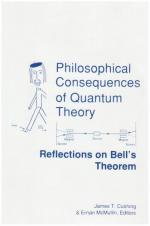|
This section contains 433 words (approx. 2 pages at 300 words per page) |

|
Bell's theorem is a logical argument in support of the completeness of quantum theory. The theorem argues against the existence of any hidden or unknown variables that might deterministically explain otherwise seemingly random events predicted by quantum mechanics.
Bell's theorem was devised in 1964 by British physicist John Stewart Bell. Sometimes known as Bell's inequalities, in quantum mechanics the theorem is an analysis of a paradox first advanced by physicists Albert Einstein, Boris Podolsky and Nathan Rosen (EPR) in a 1935 Physical Review article titled "Can Quantum Mechanical Description of Physical Reality be Considered Complete?" As a consequence, Bell's theorem is used to argue against any incompleteness or hidden variables in the quantum mechanical description of nature.
Bell's theorem examines the expected results of EPR-type experiments when it is assumed that particle properties such as momentum and position have real values prior to measurement. This assumption is made...
|
This section contains 433 words (approx. 2 pages at 300 words per page) |

|


